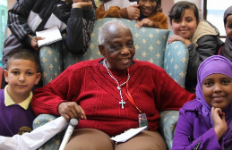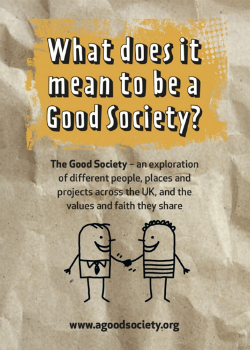The Good Society is a joint partnership between Churches Together in Britain and Ireland (CTBI) and Church Action on Poverty, and taking the idea of the Big Society as its starting point, the project is seeking to discover what a ‘Good Society’ means by giving a voice to the people already contributing to one.

Over the past two years Good Society researchers have been visiting different UK destinations to investigate how churches are tackling a huge range of social issues, including homelessness, worklessness, conflict, mental health problems, religious and ethnic tensions, poverty, lack of access to services, old age or merely loneliness.
The initial findings have been documented – and now wider conversations about what constitutes a Good Society are being encouraged.
An official project launch took place on Wednesday (21 May) at the Basil Hume Centre in Westminster.
Explaining the research already undertaken, the Revd Bob Fyffe, General Secretary of CTBI, said, ‘We wanted to learn about the thousands of people who are motivated by faith to ensure that those on the margins of society are included, cared for and supported.
‘What challenges do they face? Why do they do what they want to do? What are the values they feel most important for a good society? How can the voices of those who feel marginalised be heard more effectively?
‘And - as the spiritual landscape of Britain continue to shift - what does the growing Good Society mean for the future of the churches?’
He said what has emerged from this initial research ‘provides a challenge to the accepted role of faith and the church in seeking the common good.’
‘Faith leaders are becoming mediators and community leaders,’ he explained. ‘They are being seen as voices of truth, values and integrity, rather than holders of power. They are leading by creating possibilities, and seeing buildings as places of sanctuary and community.’
Now communities and churches across the UK are now being encouraged to have their own debate and conversations about the Good Society.

A free toolkit has been created to help facilitate conversations. The hope is that these stories and views will help inform what the Churches say together in the run-up to the next general election.
‘‘We want to promote a year of conversation about the values that have emerged, what are the marks of a good society, and seek to involve other groups,’ Bob continued.
‘We look forward to hearing from you about what is happening where you live. We want to hear your communities’ views, and we hope to give them a voice.
‘Good relationships are built on listening as well as talking. We hope the Good Society project is the beginning of a much longer period of reflection and listening on behalf of churches and wider community.’
At the project’s launch the importance of attentive listening and giving people a voice was emphasised on numerous occasions.
In his keynote speech, Archbishop Vincent Nichols spoke of how the actions of Pope Francis convey the same message as the Good Society project: that the church must be alongside the “peripheries”, the people and places most isolated from the centres of power, and give them complete attention.
He described the Good Society project as "a window on the transcendent", demonstrating values which are neglected by mainstream society. ‘What’s neglected today are the goods that we produce as a result of our relationships, which are essential to a Good Society.’
Niall Cooper, CAP director added, ‘The act of having a conversation, of hearing and sharing people’s stories, is intrinsically valuable. The lessons that can come out of that can be transformative.’